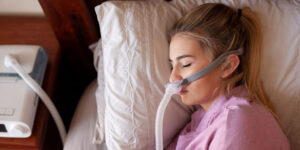Sleep Apnea Risks: Health Dangers & How to Prevent Them
Why Is Sleep Apnea Dangerous?
Sleep apnea is more than just snoring or feeling tired during the day. It is a serious sleep disorder that can have long-term consequences for your health. If left untreated, sleep apnea increases the risk of cardiovascular diseases, metabolic disorders, and even cognitive decline. You can read your article to explain : Sleep apnea : Symptoms causes and treatments

Major Health Risks of Sleep Apnea
1. High Blood Pressure and Heart Disease
Frequent interruptions in breathing cause oxygen levels to drop, putting extra strain on the heart. This can lead to:
- Hypertension (high blood pressure)
- Increased risk of heart attack
- Irregular heartbeat (arrhythmia)
2. Stroke and Brain Damage
People with untreated sleep apnea have a higher risk of stroke. The lack of oxygen during sleep affects brain function and can cause long-term cognitive impairments.
3. Type 2 Diabetes
There is a strong link between sleep apnea and insulin resistance, leading to a higher risk of developing type 2 diabetes. Poor sleep disrupts glucose metabolism, making it harder for the body to regulate blood sugar levels.
4. Daytime Fatigue and Accidents
Excessive daytime sleepiness is one of the most common symptoms of sleep apnea. This increases the risk of:
- Car accidents due to drowsy driving
- Workplace errors and reduced productivity
- Depression and mood disorders
5. Cognitive Decline and Memory Loss
Sleep apnea affects brain function, leading to:
- Memory problems
- Difficulty concentrating
- Increased risk of dementia and Alzheimer’s disease
6. Weakened Immune System
Poor sleep quality weakens the immune system, making the body more vulnerable to infections and chronic diseases.
How to Reduce the Risks of Sleep Apnea?
If you suspect sleep apnea, it’s crucial to take action:
- Consult a doctor for a sleep study
- Maintain a healthy weight to reduce airway obstruction
- Avoid alcohol and sedatives before bed
- Use a CPAP machine if prescribed by a specialist
- Sleep on your side to improve airflow
Conclusion
Sleep apnea is a serious condition with multiple health risks. Early diagnosis and proper treatment can significantly improve quality of life and reduce long-term complications. If you experience symptoms like snoring, fatigue, or breathing pauses during sleep, seek medical advice immediately.
Sleep apnea can lead to health complications, just like daytime snoring, which is studied on the French scientific site Arreter de ronfler. They should not be taken lightly.










